#it’s fine to put myself
Explore tagged Tumblr posts
Text
I was rambling on the issue of museums and human remains and how certain populations are more likely to have their bodies put on display to be gawked at and then went "well I guess the Pompeii casts were of Europeans. there are bones in there right?" and Googled it to make sure, at which point I confirmed that yes there are bones in there, but more interestingly DNA testing revealed that a cast of an adult holding a child everyone assumed was a mother and child were, in fact, a man and a kid entirely unrelated to him. Honestly that's more moving to me. Maybe they were connected in a way other than blood, but maybe a stranger saw a child when the world was ending and thought the one thing he could do was hold them.
#or maybe he was the babysitter. idk#crack open a pompeii cast like a kinder egg and there's teeth in there#now personally if people wanted to put my bones on display I'd be cool with it#maybe I'll decide to donate myself to science idk. I don't want to be used to practice face lifts though...#writing in my will 'if someone wants to have my skull on their bookshelf that's fine. put a candle inside it'#why this
45K notes
·
View notes
Text

oversaturate
#my art#jujutsu kaisen#jjk#jjk fanart#jujutsu kaisen fanart#yuji itadori#itadori yuuji#jjk yuuji#been trying some stuff out in an attempt to beat the artblock out of myself with hammers#and i LOVE how it looks but god it takes so long painting like this#i had a ref style i was going for that was a lot more washed out and watercoloury#and to be fair my take on it did start out looking more adjacent to that#u can still kinda see remnants of the initial watercolour washes in the collar of yuuji's jacket in th bottom one#but it Did Not Last fhdjfjjg what can i say im a gouache/oils gal#i can't use soft greys and watery inks i need stark blacks i need the reddest red the colour wheel will provide#one thing i did keep from the refs were the sharp prickly fine lines i think those look real cool against textured colour blocks#anyway ive also been having a lot of fun playing with rly rly harsh lighting on the hair#and even thinner linework put down after the colour as opposed to before#probably one of the reasons why it takes a lot longer but also it mimics traditional art a lot more#ill probably continue playing around with this sort of render ! or at least keep elements of it
4K notes
·
View notes
Text
they want to talk about mental illness and acceptance and how everyone is a little ocd it's cute and quirky and their "intrusive thoughts" are about cutting their hair off and you say yours are about taking a razorblade to your eye and they say ew can you not and everyone is a little adhd sometimes! except if you're late it's a personality flaw and it's because you are careless and cruel (and someone else with adhd mentions they can be on time, so why can't you?) and it's not an eating disorder if it's girl dinner! it's not mania if it's girl math! what do you mean you blew all of your savings on nonrefundable plane tickets for a plane you didn't even end up taking. what do you mean that you are afraid of eating. get over it. they roll their little lips up into a sneer. can you not, like, trauma dump?
they love it on them they like to wear pieces of your suffering like jewels so that it hangs off their tongue in rapiers. they are allowed to arm-chair diagnose and cherrypick their poisons but you can't ever miss too many showers because that's, like, "fuckken gross?" so anyone mean is a narcissist. so anyone with visual tics is clearly faking it and is so cringe. but they get to scream and hit customer service employees because well, i got overwhelmed.
you keep seeing these posts about how people pleasers are "inherently manipulative" and how it's totally unfair behavior. but you are a people pleaser, you have an ingrained fawn response. in the comments, you have typed and deleted the words just because it is technically true does not make it an empathetic or kind reading of the reaction about one million times. it is technically accurate, after all. you think of catholic guilt, how sometimes you feel bad when doing a good deed because the sense of pride you get from acting kind - that pride is a sin. the word "manipulation" is not without bias or stigma attached to it. many people with the fawn response are direct victims of someone who was malignantly manipulative. calling the victims manipulative too is an unfair and unkind reading of the situation. it would be better and more empathetic to say it is safety-seeking or connection-seeking behavior. yes, it can be toxic. no, in general it is not intended to be toxic. there is no reason to make mentally ill people feel worse for what we undergo.
you type why is everyone so quick to turn on someone showing clear signs of trauma but you already know the fucking answer, so what's the point of bothering. you kind of hate those this is what anxiety looks like! infographics because at this point you're so good at white-knuckling through a severe panic attack that people just think you're stoic. even people who know the situation sometimes comment you just don't seem depressed. and you're not a 9 year old white kid so there's no way you're on the spectrum, you're not obsessed with trains and you were never a good mathematician. okay then.
mental illness is trending. in 2012 tumblr said don't romanticize our symptoms but to be fair tiktok didn't exist yet. there's these series of videos where someone pretends to be "the most boring person on earth" and is just being a normal fucking person, which makes your skin crawl, because that probably means you are boring. your friend reads aloud a profile from tinder - no depressed bitches i fucking hate that mental illness crap. your father says that medication never actually works.
you still haven't told your grandmother that you're in therapy. despite everything (and the fact it's helping): you just don't want her to see you differently.
#writeblr#warm up#to be clear let me state again: i think you should id however you fucking want if it helps you seek peace#but there is a HUGE difference between being like '.... im undiagnosed but i think i might be X'#and a person who is like ''omg my intrusive thoughts made me buy a birkin!!!''#babe mine made me throw up bc they disgusted me so much <3#mine made me hurt myself evenly. even when i wanted to stop. i have had to put my hand on the stove MULTIPLE TIMES#and again i'd rather have 10000 people get help for something they don't need help for#than have 1 kid NOT get help#but there has GOTTTTT to be a middle ground here#bc at this point it isn't ''raising awareness''#it's . fucking misinformation. and ''what this picture says about you!!!!!''#& yes! im mostly talkin about ppl who are actually disgusted and offended by signs of mental illness#but use it to defend THEIR actions#like babe you hate when kids start yelling in the walmart? but you YOuRSELF can yell?#you are depressed so it's fine you were cruel to your spouse?#but if your spouse spends too much time in bed she's a lazy fuck?#your partner needs to do everything for you bc of your history in trauma? but when SHE has needs she's being clingy and gross?#HUGE difference here between whom i think most of my followers are btw. like#all it takes is fucking anyyyy empathy or kindness . like.#anyway it's hard to explain im hoping we all know the person im talking about lol
6K notes
·
View notes
Text
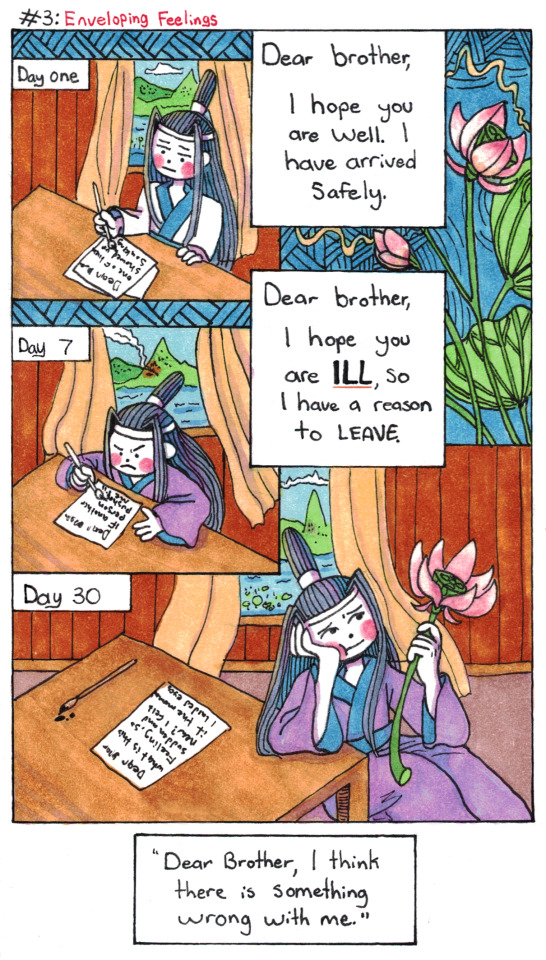
Lan Wangji Goes To Lotus Pier AU: Part 3: Enveloping Feelings.
(Part 1, Part 2, Part 4)
#poorly drawn mdzs#mdzs#lan wangji#Yungmeng Jiang training arc AU#I wanted to try out a different paneling style for this one - sorry I'm a day late! (there will still be a post tomorrow to keep on track)#The original 3 panel comic idea was fine but the point of this new schedule was to take time to push myself a bit more.#I was taking a look back through some comic artists I felt inspired by#and I really loved how Lynda Barry fills her gutters with patterns and doodles!#Obviously I'm not going as absolutely wild with it as she does but it was a great exercise!#I truly think the gutters are the most important and most overlooked part of any comic. There's lots going on in that space.#It's the same with timeskips. The implied movement between moments that we don't see changes depending on how wide that gap is#You're here for the funny tags so here's some that ties this time talk together:#I think LWJ was thinking about that second note from day 2 but it took him 7 days of hazing to commit it to paper.#I think he sends it a day later and immediately regrets it. Chasing down the messenger and everything.#You know if something actually happened to his brother he would never ever forgive himself for putting the bad vibes out there.#Third time skip was the hardest because there was so many possible flavours of jokes here. Day 8/9 was a personal favourite.#day 14 was also funny (week by week). I think the debate on 'how long does lwj take to catch feelings' is more or less:#'how long does it take for him to arrive at a particular stage of grief and yearning (and awareness of it all)#This is a symphony. There is an act by act structure. Every day he is fighting to keep his old sensibilities. He is losing so badly.#(I'll be returning to the main comic soon but there is more of this AU to come!)
2K notes
·
View notes
Text

nighttime routine in an au where the marauder’s map has pinch zoom
#iPad baby Harry potter#parasocial drarry#imagining him hard tapping this dumb piece of paper at breakfast#dw after this I took his glasses off for him and put them on the nightstand#why yes I did use a Tokyo mew mew screenshot as a pose ref#I literally can’t stop thinking abt blorbo from her tumor#harry potter#draco malfoy#drarry#draco x harry#harry x draco#hp fanart#hpdm#harco#one day I will make a real drawing that I spend real time on again#lately all I can do is doodle#which is fine i just#miss thinking ideas are worth effort or#effort pays off or whatevs#but I’m glad to be posting instead of adding to the wip graveyard#finishing doodles is better than hoarding drawings#I never end up going back lo#*lol#talking 2 myself here
368 notes
·
View notes
Text

#he's a sensitive baby idc idc#I think alla that mess would've been avoided if someone told him how fine he is#put me in coach I'll do it myself#shigaraki art#shigaraki tomura#tenko shimura#shigaraki fanart#shigaraki x reader#bnha fanart
178 notes
·
View notes
Text
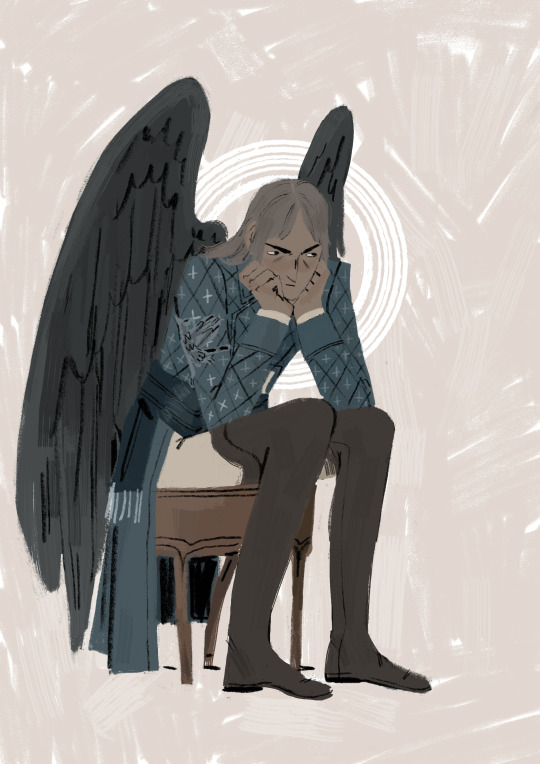
melencolia
#jena#not gonna put it in the dragon age tag cause you can barely tell but... know in your heart#im channeling the emotions veilguard gave me#(watching companions act close with each other and not rook) that's fine i'll just draw myself as a bitter angel in the corner*#*i dont even mean that as a criticism - i love bitterness and rejection in art so it's a win for me#mostly just drew this to try new brushes... i think im relying on the same steps too much and it's making art less fun#so im trying new things#my art#art tag
281 notes
·
View notes
Text

one of my resolutions is to post more stuff this year, we'll see how good i'll be at that! here's a mock-up band poster thing i made for a comic idea, which has very little bearing on anything in the story whatsoever, and which i made instead of actually working on ironing out the story like i'm supposed to be doing
#my art#illustration#furry#anthro#prolkans#(species name. another resolution is to hammer down the designs for these guys)#i have a lot of resolutions this year which inevitably means i'll get overwhelmed and give up on all of them before february#everything i'm saying sounds so negative for no reason hahaha. i promise i'm just being blithe and silly idc that much#though i really do want to get back to posting art more often but i psyche myself out from posting things SO much#having a lot of followers nowadays is very flattering but it's so much pressure. or rather i put pressure on myself#for no good reason. i think people will hunt me down with sharp objects if i post bad art.#very annoying mindset. i will shake it on god#anyway i'm doing good i'm doing fine. just saw nosferatu. the ween allegations were highly exaggerated but that's fine
155 notes
·
View notes
Text
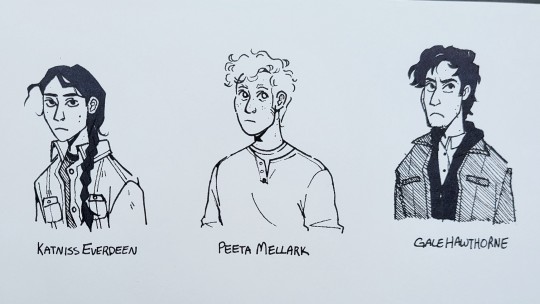
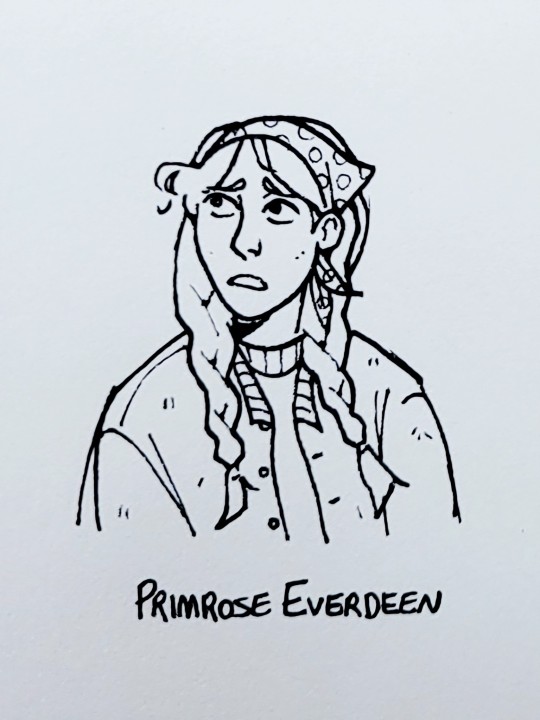
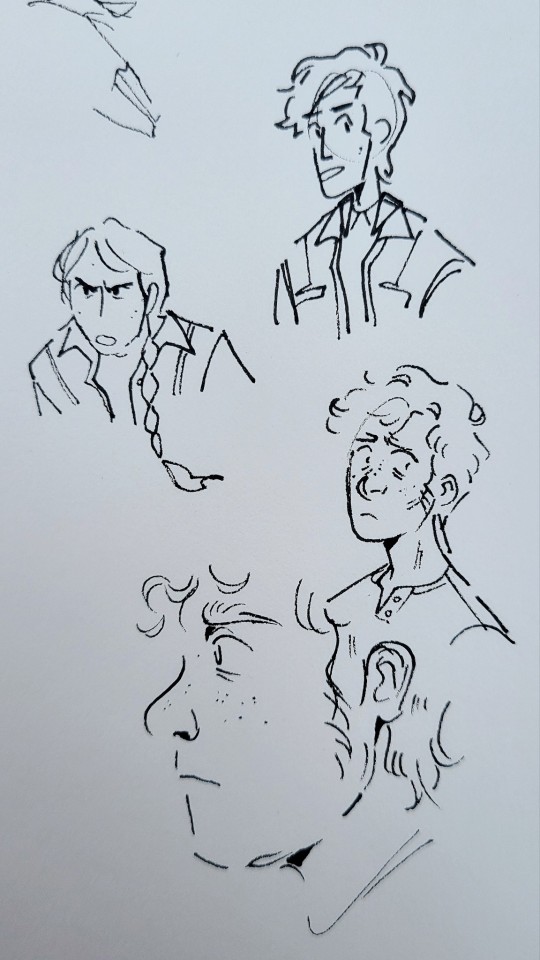
I finished the silly game trilogy and it made me Sad
#i really liked the first two books and the third one was 👍🏻 Fine#the hunger games#thg#katniss everdeen#peeta mellark#gale hawthorne#primrose everdeen#myart#i haveee a lot of art i havent posted cause the amount of times i draw within like a week is#sparse to say the least#i will try to post more! dont wanna put a lotta pressure on myself since im just doin all this for fun wahoo#i feel like i need a new project to work on or smthn. but i dont wanna woorrrkkk..... SIGH
635 notes
·
View notes
Text
patience being tested. being forced by a bizarre unfortunate situation to adhere to university requirement technicality by taking this simple basic elementary "introduction to environmental history" class.
this class is from facilitators/program which do, like, "history of the American frontier" or "history of fishing and hunting" and still basically subscribe to that old-school twentieth-century idealization and celebration of characters like Teddy Roosevelt and reverence for a mythical arc-of-history-bent-towards-justice narrative of the often-clumsy but ultimately-benevolent US federal government and its mission to "save nature" through the miracle of "sustained yield," while heroic federal land management agencies and "heritage" institutions lead to way, staffed by exceptional individuals (appeals to nostalgia for the frontier and an imagined landscape of the American West; ego-stroking appeals to flattering self-image that center the environmentalist or academic). where they invoke, y'know, ideas like "ecology is important because don't you enjoy cross-country skiing in The Woods with your niece and nephew? don't you like hunting and fishing?" which makes it feel like a time capsule of appeals and discourses from the 1970s. and it invokes concept of "untouched wilderness" (while eliding scale of historical Indigenous environmental relationships and current ongoing colonial violence/extractivism). but just ever-so-slightly updated with a little bit of chic twenty-first-century flair like a superficial land acknowledgement or a reference to "labor histories" or "history from below," which is extra aggravating when the old ideologies/institutions are still in power but they're muddying the water and diluting the language/frameworks (it's been strange, watching words like "multispecies" and "Anthropocene" over the years slowly but surely show-up on the posters, fliers, course descriptions, by now even appearing adjacent to the agri-business and resource extraction feeder programs, like a recuperation or appropriation.) even from a humanities angle, it's still, they're talking at me like "You probably didn't know this, but environmental history is actually pretty entangled with political and social events. In fact, we can synthesize sources and glean environmental info from wacky places like workers' rolls in factories, ship's logs, and poetry from the era." and i'm nodding like YEP.
the first homework assignment is respond to this: "Define and describe 'the Anthropocene'. Do you think 'the Anthropocene' is a useful concept? Why or why not?" Respond in 300 words.
so for fun, right now in class, going to see how fast i can pull up discussion of Anthropocene-as-concept solely from my old posts on this microblogging site.
---
ok, found some
---
I think that the danger in any universal narrative or epoch or principle is exactly that it can itself become a colonizing force. [...] I’m suspicious of the Anthropocene as concept for the very reason that it subsumes so many peoples, nations, histories, geographies, political orders. For that reason, I think ideas like the Anthropocene can be a useful short-hand for a cluster of tangible things going on with the Earth at the moment, but we have to be very careful about how fluid and dynamic ideas become concretized into hegemonic principles in the hands of researchers, policymakers, and politicians. There’s so much diversity in histories and experiences and environmental realities even between relatively linked geographies here in Canada [...]. Imagine what happens when we try to do that on a global scale - and a lot of euro-western Anthropocene, climate change and resilience research risks doing that - eliding local specificities and appropriating knowledge to serve a broader euro-western narrative without attending to the inherent colonial and imperial realities of science and policy processes, or even attending to the ways that colonial capitalist expansion has created these environmental crises to begin with. While we, as a collective humanity, are struggling with the realities of the Anthropocene, it is dangerous to erase the specific histories, power-relations, political orders that created the crisis to begin with. So, I’m glad that a robust critique of the Anthropocene as a concept is emerging.
Text by: Words of Zoe Todd, as interviewed and transcribed by Caroline Picard. “The Future is Elastic (But it Depends): An Interview with Zoe Todd.” 23 August 2016.
---
---
---
The Great Acceleration is the latest in a series of human-driven planetary changes that constitute what a rising chorus of scientists, social scientists, and humanists have labeled the Anthropocene - a new Age of Humans. [...] But what the Anthropocene label masks, and what the litany of graphs documenting the Great Acceleration hide, is a history of racial oppression and violence, along with wealth inequality, that has built and sustained engines of economic growth and consumption over the last four centuries. [...] The plantation, Sidney Mintz long ago observed, was a “synthesis of field and factory,” an agro-industrial system of enterprise [...]. Plantation legacies, along with accompanying strategies of survival and resistance, dwell in the racialized geographies of the United States’ and Brazil’s prison systems. They surface in the inequitable toxic burdens experienced by impoverished communities of color in places like Cancer Alley, an industrial corridor of petrochemical plants running along the Mississippi River from New Orleans to Baton Rouge, where cotton was once king. And they appear in patterns of foreign direct investment and debt servitude that structure many land deals in the Caribbean, Brazil, and sub-Saharan Africa [...]. [C]limatologists and global change scientists from the University of London, propose instead 1610 as a date for the golden spike of the Anthropocene. The date marked a detectable global dip in carbon dioxide concentrations, precipitated, they argue, by the death of nearly 50 million indigenous human inhabitants [...]. The degradation of soils in the tobacco and cotton-growing regions in the American South, or in the sugarcane growing fields of many Caribbean islands, for example, was a consequence of an economic and social system that inflicted violence upon the land and the people enslaved to work it. Such violent histories are not so readily evident in genealogies that date the Anthropocene’s emergence to the Neolithic Revolution 12,000 years ago, the onset of Europe’s industrial revolution circa 1800, or the Trinity nuclear test of 1945. Sugarcane plantations were already prevalent throughout the Mediterranean basin during the late middle ages. But it was during the early modern era, and specifically in the Caribbean, where the intersection of emerging proto-capitalist economic models based on migratory forced labor (first indentured servitude, and later slavery), intensive land usage, globalized commerce, and colonial regimes sustained on the basis of relentless racialized violence, gave rise to the transformative models of plantations that reshaped the lives and livelihoods of human and non-human beings on a planetary scale. [...] We might, following the lead of science studies scholar Donna Haraway and anthropologist Anna Tsing, more aptly designate this era the Plantationocene. [...] It is also an invitation to see, in the words of geographer Laura Pulido, “the Anthropocene as a racial process,” one that has and will continue to produce “racially uneven vulnerability and death." [...] And how have such material transformations sustained global flows of knowledge and capital that continue to reproduce the plantation in enduring ways?
Text by: Sophie Sapp Moore, Monique Allewaert, Pablo F. Gomez, and Gregg Mitman. "Plantation Legacies." Edge Effects. 22 January 2019. Updated 15 May 2021. [Bold emphasis added by me.]
---
---
---
Geologists and other scientists will fight over [the definition of the beginning start-date of the Anthropocene] in scientific language, seeking traces of carbon dioxide that index the worst offenses of European empire which rent and violated the flesh, bodies, and governance structures of Indigenous and other sovereign peoples in the name of gold, lumber, trade, land, and power. [...] The stories we tell about the origins of the Anthropocene implicate how we understand the relations we have with our surrounds. In other words, the naming of the Anthropocene epoch and its start date have implications not just for how we understand the world, but this understanding will have material consequences, consequences that affect body and land.
Text by: Heather Davis and Zoe Todd. On the Importance of a Date, or Decolonizing the Anthropocene. ACME An International Journal for Critical Geographies. December 2017. [Bold emphasis added by me.]
---
---
---
From Aime and Suzanne Cesaire, C. L. R. James, Claudia Jones, Eduoard Glissant, through Sylvia Wynter, Christina Sharpe, and so many others, critical anticolonial and race theory has been written from the specific histories that marked the Black Atlantic. [...] Glissant also reminds us, secondly, of how cunning the absorptive powers of [...] liberal capitalism are - how quickly specific relations are remade as relations-erasing universal abstractions. [...] This absorptive, relations-erasing universalism is especially apparent in some contemporary discourses of […] liberalism and climate collapse - what some call the Anthropocene - especially those that anchor the crisis in a general Human calamity which, as Sylvia Wynter has noted, is merely the name of an overdetermined and specific [White] European man. […] [T]he condition of creating this new common European world was the destruction of a multitude of existing black and brown worlds. The tsunami of colonialism was not seen as affecting humanity, but [...] these specific people. They were specific - what happened to them may have been necessary, regrettable, intentional, accidental - but it is always them. It is only when these ancestral histories became present for some, for those who had long benefitted from the dispossession [...], that suddenly the problem is all of us, as human catastrophe.
Text by: Elizabeth Povinelli. “The Ancestral Present of Oceanic Illusions: Connected and Differentiated in Late Toxic Liberalism.” e-flux Journal Issue #112. October 2020.
---
The narrative arc [of White "liberal humanism"] [...] is often told as a kind of European coming-of-age story. […] The Anthropocene discourse follows the same coming-of-age [...] script, searching for a material origin story that would explain the newly identified trajectory of the Anthropos […]. Sylvia Wynter, W.E.B. DuBois, and Achille Mbembe all showed how that genealogy of [White subjecthood] was [...] articulated through sixteenth- through nineteenth-century [historiographies and discourses] in the context of colonialism, [...] as well as forming the material praxis of their rearrangement (through mining, ecological rearrangements and extractions, and forms of geologic displacements such as plantations, dams, fertilizers, crops, and introduction of “alien” animals). […] As Wynter (2000) commented, “The degradation of concrete humans, that was/is the price of empire, of the kind of [Eurocentric epistemology] that underlies it” (154).
Text by: Kathryn Yusoff. “The Inhumanities.” Annals of the American Association of Geographers, Volume 11, Issue 3. November 2020.
---
---
---
As Yarimar Bonilla suggests in regard to post-Irma-and-Maria Puerto Rico, “vulnerability is not simply a product of natural conditions; it is a political state and a colonial condition.” Many in the Caribbean therefore speak about the coloniality of disaster, and the unnaturalness of these “natural” disasters [...]. Others describe this temporality by shifting [...] toward an idea of the Plantationocene [...]. As Moore and her colleagues write, “Plantation worlds, both past and present, offer a powerful reminder that environmental problems cannot be decoupled from histories of colonialism, capitalism, and racism that have made some human beings more vulnerable [...].” [W]e see that contemporary uneven socioecologies associated with the rise of the industrial world ["the Anthropocene"] are based [...] also on the racialized denial and foreshortening of life for the sacrificial majority of black, brown, and Indigenous people and their relegation to the “sacrifice zones” of extractive industry. [...] [A]ny appropriate response to the contemporary climate emergency must first appreciate its foundations in the past history of the violent, coercive, transatlantic system of plantation slavery; in the present global uneven development, antiblackness, and border regimes that shape human vulnerability [...] that continues to influence who has access to resources, safety, and preferable ecologies [...] and who will be relegated to the “plantation archipelagoes” (as Sylvia Wynter called them) [...].
Text by: Mimi Sheller. “Thinking Beyond Coloniality: Toward Radical Caribbean Futures.” Small Axe (2021), 25 (2 (65)), pages 169-170. Published 1 July 2021. [Bold emphasis added by me.]
---
---
---
Indigenous genocide and removal from land and enslavement are prerequisites for power becoming operationalized in premodernity [...]; it was/is a means to operationalize extraction (therefore race should be considered as foundational rather than as periphery to the production of those structures and of global space). [...] Wynter suggests that we […] consider 1452 as the beginning of the New World, as African slaves are put to work on the first plantations on the Portuguese island of Madeira, initiating the “sugar-slave” complex - a massive replantation of ecologies and forced relocation of people […]. Wynter argues that the invention of the figure of Man in 1492 as the Portuguese [and Spanish] travel to the Americas instigates at the same time “a refiguring of humanness” in the idea of race. [...] The natal moment of the 1800 Industrial Revolution, […] [apparently] locates Anthropocene origination in […] the "new" metabolisms of technology and matter enabled by the combination of fossil fuels, new engines, and the world as market. […] The racialization of epistemologies of life and nonlife is important to note here […]. While [this industrialization in the nineteenth century] […] undoubtedly transformed the atmosphere with […] coal, the creation of another kind of weather had already established its salient forms in the mine and on the plantation. Paying attention to the prehistory of capital and its bodily labor, both within coal cultures and on plantations that literally put “sugar in the bowl” (as Nina Simone sings) […]. The new modes of material accumulation and production in the Industrial Revolution are relational to and dependent on their preproductive forms in slavery […]. In 1833, Parliament finally abolished slavery in the British Caribbean, and the taxpayer payout of £20 million in “compensation” [paid by the government to slave owners for their lost "property"] built the material, geophysical (railways, mines, factories), and imperial infrastructures of Britain and its colonial enterprises and empire. [...] A significant proportion of funds were invested in the railway system connecting London and Birmingham (home of cotton production and […] manufacturing for plantations), Cambridge and Oxford, and Wales and the Midlands (for coal). Insurance companies flourished [...]. The slave-sugar-coal nexus both substantially enriched Britain and made it possible for it to transition into a colonial industrialized power […]. The slave trade […] fashioned the economic conditions (and institutions, such as the insurance and finance industries) for industrialization.
Text by: Kathryn Yusoff. "White Utopia/Black Inferno: Life on a Geologic Spike". e-flux Journal Issue #97. February 2019. [Bold emphasis added by me.]
#sorry for being mean#instructor makes podcasts about cowboys HELP ME#and he recently won a New Business award for his startup magazine covering Democrat party politics in local area HELP#so hes constantly performing this like dance between new hip beerfest winebar coolness and oldfashioned masculinity#but hes in charge of the certificate program so i have to just shut up and keep my head down for approximately one year#his email address is almost identical to mine and invokes enviro history terms but i made mine long before when i was ten years old#so i could log in to fieldherpforum dot com to talk about enviro history of distribution range changes in local reptiles and amphibians#sir if you read my blog then i apologize ive had a long year#and i cant do anything to escape i am disabled i am constantly sick im working fulltime i have NO family i have NO resources#i took all of this schools graduate level enviro history courses and seminars years ago and ran the geography and enviro hist club#but then left in final semester because sudden hospitalization and crippled and disabled which led to homelessness#which means that as far as any profession or school is concerned im nobody im a retail employee#i was doing conference paper revisions while sleeping on concrete vomiting walking around on my cane to find outdoor wifi#and im not kidding the MONTH i got back into a house and was like ok going back to finish the semester the school had#put my whole degree program and department in moratorium from lack of funding#and so required starting some stuff from scratch and now feel like a hostage with debt or worsening health that could pounce any moment#to even get back in current program i was working sixteen hours a day to pay old library fines and had to delicately back out of workplace#where manager was straight up violently physically abusive to her vulnerable employees and threatened retaliation#like an emotional torturer the likes of which i thought existed only in cartoons#and the week i filed for student aid a massive storm had knocked out electricity for days and i was clearing fallen tree debris#and then sitting in the dark in my room between job shifts no music no phone no food with my fingers crossed and i consider it a miracle#sorry dont mean to dramatize or draw attention to myself#so actually im happy you and i are alive
134 notes
·
View notes
Text
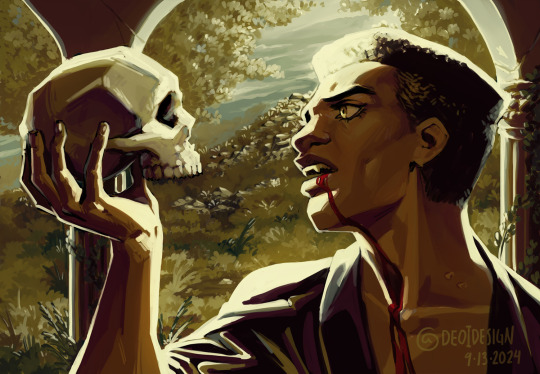
Thinking about vampires, death, life, and the space they occupy in between
#to be or not to be. that is the question#ty adam for being my model for dramatic vampire moment#musings on the thinkings about:#when to live you are required to hurt others. you must repeatedly ask yourself what the value of your life is#To sleep... perchance to dream...#ah. THERES THE RUB.#ok I actually couldnt come up with too many thoughts. I had a lot more while I was drawing this but I guess I put them in the painting LOL#reading that soliloquy and being like damn this is just like vampires#the reality of course is that the soliloquy is a debate over suicide and ultimately making the choice to live#even if just out of fear of the unknown#and vampires are about dying and then in undeath choosing to continue to live#despite the fear of eternity and loneliness and hurting others#theyre not the same. but like let me thiiink come onnnn I'm allowed to thiiink and have incomplete thoughts#I would have to write like a proper essay about this to organize my thoughts. this is the tags on a tumblr post.#anyways finished episode 79#working on patreon stickers for this month (and next month soon)#and working on book 4. taking a pause from episodes cause I've got 3 weeks of buffer now... UGH#I'm so mad that they changed it. it would have been 5 weeks before but it's fine it's whatever#anyways yeah taking a break from episodes to make my book now!#its good stuff.#and this painting is good stuff#banger after banger from me tbh#this was a little relaxing giving myself a couple hours to muse#it's necessary for my health and I always forget that til I do a painting...#I loved doing the little landscape in the background too I should do that more! I love how plants are just like whatever shape you want#like you can make up any plant you want and not only does that plant PROBABLY exist somewhere#a weirder plant exists somewhere too. so. literally whatever you want#ok bye again for a few days while I get back to work
283 notes
·
View notes
Text
‘Take ur heart!
Venture (Overwatch) x reader
Authors note!!! (¬‿¬ ); (UPDATE: PLEASE GO READ MY OTHER POSTS INSTEAD CUZ I LITERALLY HATEE THIS ONE AHHHH THE OTHERS R SM BETTER I SWEAR!! IM STILL LEARNING!!!) First fic ever (and last knowing me!) and ofc it’s overwatch related…. I’ve literally never written a fanfic before so pls give me feedback!! I feel like it’s a bit boring just cuz we haven’t learned a lot abt them yet so it’s very surface lvl!!
“I got this one while digging in Acropolis! And this one from a site in Giza!” They said enthusiastically pointing to some scars on their forearm.
You and your new colleague, which you now know goes by Venture, had met on the rooftop of your work building about an hour ago when you both had coincidentally needed some fresh air. You hadn't even been there for more than 5 minutes before you heard the door to the rooftop open. Despite having just met, you found yourself immediately drawn to their easygoing nature. They spoke with a lightness and joy that seemed contagious and you couldn’t help but be caught hook line and sinker.
“And this one—" they grinned awkwardly, pointing to the chip in their front teeth. “This um…” They lowered their finger, looking away a bit embarrassed. “It was nothing.”
You chuckled at how much of a bad liar they were and as curious as you were, you didn't want to pry into anything that might make them uncomfortable, so you decided to swiftly take the attention off it.
"How'd you get this one?" you reach out to take their hand pointing to a deep scar you had noticed on their thumb.
"Oh I got that one fighting a monkey for a rock in Suravasa." they shrugged and you couldn't help but laugh at how casual they were.
"Scary!"
"Nah, just annoying! Little dude didn't know what he had coming... I may have been scathed but I won the war!"
You shook your head in amusement at their nonchalant attitude towards what sounded like a crazy life and as you leaned against the railing you noticed yourself admiring them more and more.
After a bit of rambling Venture seemed to have come back to their senses stopping abruptly. They took a second to look at you closely noticing how you were genuinely interested. You weren't still there out of pity or asking questions for conversations sake, you genuinely liked listening to them talk which Venture had realized pretty early on that in professions like theirs, was pretty rare. They couldn't help but feel flustered under your gaze, quickly trying to put the attention off of them and on to you.
"Well what about you? Any things you're passionate about?"
As the conversation flowed, you found yourself sharing stories of your own, although they were average compared to theirs. Nevertheless, they listened with genuine interest, nodding along and occasionally butting in with words of praise or curiosity.
Before you knew it, the sun had begun to set and the evening breeze was ruffling your hair as you stood in silence, content with each other's company.
"I bit a rock."
"...hah?"
"I bit a rock... and it chipped my tooth."
"..."
(* ^ ω ^)
#venture x reader#venture overwatch#overwatch x reader#I HATE THIS TBHH AHH#BUT ITS ONLY MY FIRST FIC SOOO#fine i'll put more trust in myself!!
417 notes
·
View notes
Text
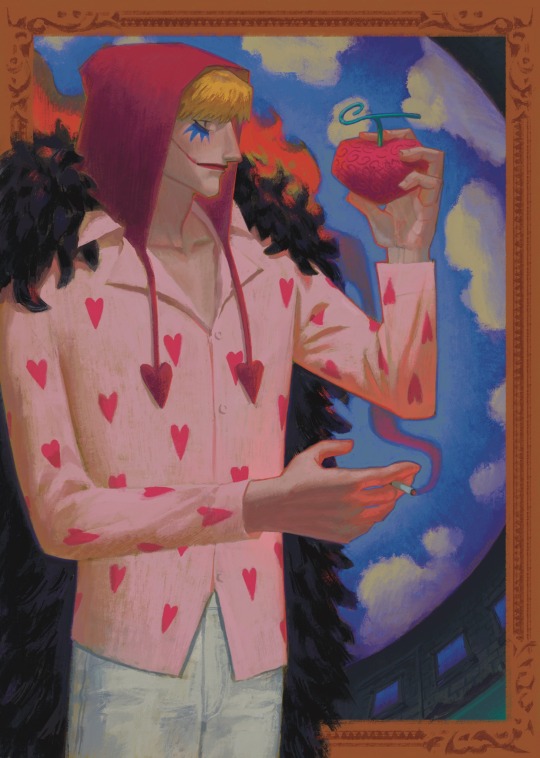
#one piece#corazon#donquixote rosinante#op corazon#FINALLY DONE W THIS#dont look at the overrendered hand#the law drawing turned out better lol#thats fine tho#sometimes you have to flop a little#cant always pull out bangers#im not annoyed at all#<- i say as i punch the wall repeatedly#NOT PUTTING MYSELF DOWN BTW#its just that i think i could do a lot better…#which is to say i believe in my POTENTIAL#thats what one piece taught me#thanks oda
448 notes
·
View notes
Text
You know these tropes in stories where if you lose your soulmate you're left forever yearning for something just out of your reach, forever searching for something you can never find? That's me, JRWI Riptide is my soulmate. Send post
#I can NEVER stick around long enough for any other dnd podcast#or any other jrwi campaign really#I've listened to like 40 hours of one of critical role's campaigns on the background and I cannot tell you names of its main characters#it was fine and I get why people are crazy about it but.. it's not it#doesn't tickle my brain the same way#too serious and yet somehow not serious enough???#riptide was the only thing that made me realize dnd can be REALLY fun#even wanted to try it myself but I don't have anyone to play with#ANYWAY will have to relisten to riptide next year. have been putting it off because I'm scared it will once again consume me whole#jrwi riptide#jrwi#jrwiblr#notes&thoughts
116 notes
·
View notes
Text

carefully attempted to draw (still sick); wanted to give Shargon another redesign, this is an older version of him but the basics should also go for his younger self (idk yet about his lung replacement design; arms are posed weird to make anatomy clearer)
(wip, oc art, Shargon, he/they)
#ganondoodles#art#oc#oc art#wip#character design#im really liking this one ngl#posted this on twitter but didnt here bc its just a wip but .. idk how far i will get with this lol#i know barely anyone is interested in oc art#especially when its not my usual big buff type i love so much#everything needs a lil variety tho!#and this build just fits shargon more than the typical#if anyone can make sense of it-#the extra arms he gets (red ones) are bc he gains another heart from Eadrya so he has two hearts and two elements now thus changed#(dw Eadrya is fine .... it makes sense in lore but its alot to explain and i dont think anyone would care anyway)#not trying to be dismissive- just realistic to save myself the time writing it and disappointment when no one reads it :U#i need to put more effort into oc art if i want anyone to care#at least i know Eadrya has always at least one fan (thank you calamity <3)
163 notes
·
View notes
Text
The trick to writing a good story is to make sure it has at least one element that people like so much that they don't care if other elements are imperfect.
People are drawn to stories with stuff they like; they're going to like flawed stories that have those things more than they're going to like perfect stories that don't have those things. I personally love certain authors because of one thing they do well--I go to this one for character, and this one for intricate plot, and this one for immersive worldbuilding, etc.--and get confused when people complain about the other elements not being done well because that's not what I'm reading for. If one element is really well-done, I will forgive a million other storytelling sins that would make me tear apart a book I liked less. If I can give that grace to other authors, I can trust other readers to give me that same grace, if they like my stories well enough to keep reading them.
#adventures in writing#also sparked by the q#because there are so many things about that book that could be better#or that i would tear apart in another book#but because the romance is *so* well done i'm obsessed with it again#i've also noticed this as i've started posting a higher volume of stories#the well-known fairy tales are going to get more attention than the lesser-known retellings with better writing#and that's fine and i can give myself grace to just write what i want to write with as much effort as i want to put in
192 notes
·
View notes